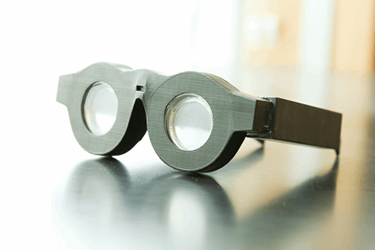Liquid Lens Technology Enables Smart Glasses To Focus Automatically

Novel eyeglass technology developed at the University of Utah (UU) uses “liquid lenses” to adjust focus based on where the wearer is looking. The glasses are connected to a smartphone app and can be wirelessly customized to suit individual corrective lens prescriptions.
Corrective lenses are used to overcome refractive errors in eyeball shape that limit the retina’s ability to focus light. Nearsightedness and farsightedness are common examples of refractive errors. As the human eye ages, it loses the ability to adjust for distance and to focus on close objects. People with complex vision issues often need a separate pair of reading glasses or multifocal lenses that enable them to view objects at varying distances.
Through funding from the National Institute of Health (NIH) and the National Institute for Biomedical Imaging and Bioengineering (NIBIB), a team of engineers at UU have created a pair of corrective lenses that can do the job of multiple pairs of glasses using liquid lenses, which consist of liquid glycerin enclosed between two flexible rubber membranes. Mechanical actuators attached to the rear membrane can adjust the curvature of the liquid lens electronically, based on infrared distance meters encased in the frame’s bridge. As the wearer turns their attention to different objects, the lenses adjust automatically, in less than 14 milliseconds.
“Most people who get reading glasses have to put them on and take them off all the time,” Carlos Mastrangelo, professor of electrical and computer engineering, told UU’s UNews. “You don’t have to do that anymore. You put these on, and it’s always clear.”
The eyeglass prototype — described in a study published by Optics Express — is powered by a battery built into the frame that can last up to 24 hours. Eyeglass wearers can use a connected smartphone app to program the glasses to suit their individual prescription, and the glasses do not need to be replaced as their prescription changes over time.
Mastrangelo’s team recently introduced a prototype of the glasses at the Consumer Electronics Show (CES) in Las Vegas, commenting that they would continue to rework the design to make the glasses smaller and less bulky. The eyeglasses could be ready for commercialization as early as 2020 through a startup called Sharpeyes LLC.
Verily and Novartis are currently developing smart contact lenses capable of auto-refocusing through a partnership that began in 2014. Human clinical trials for the lenses have experienced delays, but Novartis CEO Joe Jimenez told a Swiss newspaper last November that the technology was “on track.” The partnership is also working on contact lenses that monitor glucose levels, though that concept has faced feasibility issues.
Last April, Novartis’ Alcon partnered with startup PowerVision to develop a fluid-based lens implant for cataract patients who require reading glasses. The liquid responds to muscle movement in the eye to change shape and focus on objects at varying distances.
Image credit: Dan Hixson/University of Utah College of Engineering
